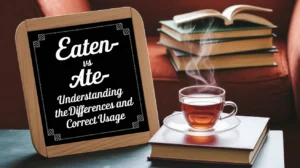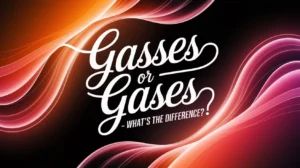Last Updated on April 13, 2025 by Henry Perry
Are you ever unsure whether to say “I ate lunch” or “I have eaten lunch”? You’re not alone! Grammar, especially with verbs, can get confusing, but understanding the difference between ate and eaten is essential for speaking and writing correctly.
This guide will break down everything you need to know about these two forms of the verb eat—from basic definitions to real-world examples and common mistakes.
Mastering the use of ate and eaten will not only improve your grammar but also help you sound more professional in your writing and speaking.
Whether you’re a native speaker or learning English as a second language (ESL), this article is for you.
We’ll explore the correct usage, common errors, and tips to help you confidently choose between ate and eaten in any context. Let’s dive in and clear up any confusion!
What Does “Ate” Mean?
Ate is the simple past tense of the verb eat. It’s used when referring to an action that was completed at a specific point in the past, with a clear time reference. It doesn’t require any auxiliary verbs (like “have” or “had”).
When to Use “Ate”
You use ate when describing an action that happened and was completed at a definite time in the past. It answers the question, When did something happen? Here are some examples:
- “I ate breakfast at 8 AM.”
- “She ate all the cookies yesterday.”
- “We ate dinner at 7 PM last night.”
Time Expressions with “Ate”
Common time words like yesterday, last week, and two hours ago often accompany ate because they clearly place the action in the past:
- “I ate lunch two hours ago.”
- “He ate pizza last night.”
Mistakes to Avoid with “Ate”
Sometimes learners mistakenly use ate when it’s not the right form. A common mistake is saying “I have ate” instead of “I have eaten.” Remember, ate is always used in the simple past tense and never with helping verbs like have, has, or had.
- ❌ “I have ate lunch”
- ✅ “I ate lunch.”
Now that we understand ate, let’s move on to the more complicated eaten!
What Does “Eaten” Mean?
Eaten is the past participle form of eat, used in more advanced tenses like the present perfect, past perfect, and future perfect. It’s also used in the passive voice.
When to Use “Eaten”
The past participle eaten requires a helper verb such as have, has, or had. These verbs are used to form perfect tenses and passive voice. Here are some examples of how eaten fits into different sentence structures:
Present Perfect
- “I have eaten already.” (This means the action was completed at an unspecified time in the past, but it’s relevant to the present moment.)
Past Perfect
- “He had eaten before they arrived.” (This shows that the action happened before another past event.)
Future Perfect
- “By the time you arrive, I will have eaten.” (This indicates an action that will be completed before another future action.)
Mistakes to Avoid with “Eaten”
Because eaten is a past participle, it always needs a helper verb. Here’s an example of the wrong use:
- ❌ “I eaten breakfast.”
- ✅ “I have eaten breakfast.”
Key Differences Between “Ate” and “Eaten”
Understanding when to use ate and when to use eaten is vital to speaking and writing clearly. Below are the key differences:
| Feature | Ate | Eaten |
| Verb Form | Simple Past | Past Participle |
| Requires Auxiliary Verb? | No | Yes (have, has, had) |
| Used in Tense | Simple past (action completed at a specific time) | Perfect tenses, passive voice |
| Example | “I ate dinner at 6 PM.” | “I have eaten dinner already.” |
Examples in Context
- Ate: “I ate at the new restaurant last night.”
- Eaten: “I have eaten there before.”
Using “Ate” and “Eaten” in Perfect Tenses
Let’s now take a closer look at how eaten fits into perfect tenses. These tenses express actions that are related to other actions in the past or future.
Present Perfect
- Definition: The present perfect describes an action that was completed at an unspecified time in the past but is relevant to the present. The structure is: have/has + past participle (eaten).
- Example: “I have eaten all the cookies.” (The action of eating happened in the past, but it affects the present—there are no cookies left!)
Past Perfect
- Definition: The past perfect shows that an action was completed before another past action. The structure is: had + past participle (eaten).
- Example: “By the time I got to the party, they had eaten all the food.”
Future Perfect
- Definition: The future perfect describes an action that will be completed before a specified time in the future. The structure is: will have + past participle (eaten).
- Example: “By the time you arrive, I will have eaten.”
The Passive Voice with “Eaten”
The passive voice focuses on the action itself rather than the person performing the action. Eaten is often used in passive constructions.
How it Works
In passive sentences, the subject receives the action, and eaten is always used as the past participle.
- Example: “The cake was eaten by the children.”
- Example: “The pizza has been eaten by the family.”
Common Phrases and Idioms Using “Ate” and “Eaten”
There are several common expressions and idioms where the words ate and eaten are used. Understanding these phrases will help you sound more natural in everyday conversations.
Phrases with “Ate”
- Ate like a horse: To eat a lot, often in a very hungry way.
- Ate your words: To take back something you said because it was wrong.
- Ate it up: To eagerly accept or believe something.
Phrases with “Eaten”
- Eaten alive: Overwhelmed or greatly affected by something, like pressure or criticism.
- Eaten out of house and home: Consuming all the food in the house, often used when someone eats a lot.
- Eaten with guilt: Feeling deep regret or remorse for something you did.
How to Avoid Common Mistakes
It’s easy to make mistakes when using ate and eaten, especially for ESL learners or when speaking quickly. Here are a few tips to help you stay on track:
Tips for Correct Use
- Always check for time references when using ate—it’s usually paired with specific past time markers.
- Remember that eaten needs helper verbs like have, has, or had.
- Practice with flashcards or grammar apps to reinforce the difference.
Exercises for Practice
- Fill in the blanks: Choose between ate or eaten.
- “She has ___ her lunch already.”
- “I ___ too much last night.”
- Correct the sentences:
- “I have ate all the snacks.”
- “By 6 PM, they will have ate.”
Conclusion
Mastering the difference between ate and eaten is an important part of perfecting your English grammar. Remember, ate is for actions completed in the past with a clear time reference, while eaten is the past participle that requires auxiliary verbs like have or had for perfect tenses and passive voice.
By practicing and keeping these rules in mind, you’ll be able to use both terms correctly in any situation. Whether you’re speaking casually with friends, writing an email for work, or completing an English test, you’ll sound more confident and professional.
FAQs About Eaten vs. Ate
1. What’s the main difference between “ate” and “eaten”?
The word “ate” is the simple past tense of eat—used when describing an action that happened at a specific time in the past.
“Eaten” is the past participle of eat—used with helping verbs like have, has, or had in perfect tenses.
2. Can I say “I have ate”?
❌ No, “I have ate” is grammatically incorrect.
✅ The correct form is “I have eaten” because “eaten” is the proper past participle to use with the auxiliary verb have.
3. Is “eaten” always used with “have,” “has,” or “had”?
Yes. “Eaten” is the past participle and must be paired with a helping verb (also known as an auxiliary verb) like have, has, or had:
- “She has eaten.”
- “They had eaten.”
- “I have eaten.”
4. Is it correct to say “I eaten breakfast”?
❌ No, that’s incorrect.
✅ You must say either:
- “I ate breakfast.” (Simple past)
- “I have eaten breakfast.” (Present perfect)
5. What’s an easy way to remember when to use “ate” or “eaten”?
- Use “ate” when there is no helping verb and you’re talking about a specific time in the past.
- Use “eaten” when you need a perfect tense (present perfect, past perfect, future perfect) or passive voice, and it will always be with a helper verb like have, has, or had.

Henry Perry is the resident pun aficionado at Punny Universe. With a sharp sense of humor and a talent for wordplay, Henry crafts puns that are as clever as they are entertaining. His love for laughter shines through in every piece he writes, making sure readers leave with a smile.












